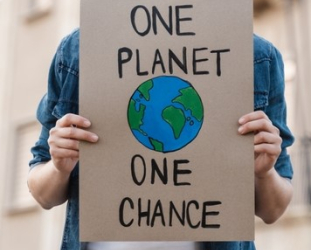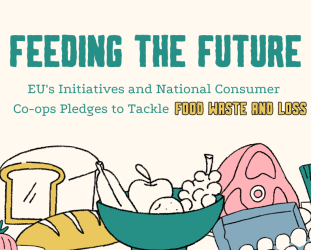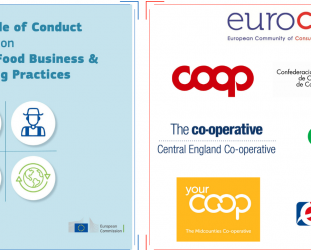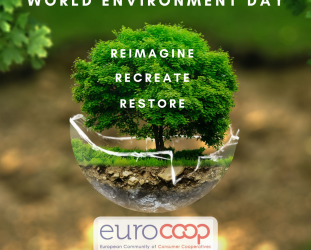Towards a zero waste society: a Euro Coop Perspective
16.06.2011 13:41:17

Consumer co-operatives gathered in Euro Coop are well aware of this unsustainable situation. As responsible economic and social actors which operate on the market according to values and principles, they believe that it needs to be urgently tackled by putting an increasing emphasis on reducing waste as well as on adding value to the waste that has already been produced by considering it as a new resource to be re-introduced in the productive circle.
Consumer cooperatives’ responsibility and actions
In concrete terms, Euro Coop members are committed to implement an enhanced waste prevention as well as an effective waste minimisation activity. Their responsibility with regard to waste production and handling is both direct, i.e. at distribution centres and outlets, and indirect, i.e. in the households as result of post-sale consumption.
Direct production at distribution centres and outlets
As regards action at distribution centre and outlet level, consumer co-operatives regularly sort out a wide range of materials including among others cardboard, glass, steel, aluminium and plastic. In addition to this activity, whose effectiveness also depends on the existing infrastructure in place in the different member states (MS), they are also committed to pursue an effective packaging optimisation.
In this respect, several consumer co-operatives gathered in Euro Coop are already working towards:
- Light-weighting, right-sizing and down-gauging the packaging of own-branded goods so to optimise transport processes as well as warehouse and in-store availability;
- Working with suppliers to define packaging requirements (shape and material) so to minimise empty spaces during the transport process, in warehouses and on-shelf;
- Making a progressively enhanced use of reusable transportation pallets and containers;
- Eliminating potentially harmful substances in the packaging materials so to facilitate recycling processes;
- Optimising planning and backhauling activities, also for used materials, through an enhanced use of automatic ordering systems;
- Reducing of multiple layer packaging;
- Recovering unsold food products which are still edible to donate them to people in need.
Indirect production resulting from consumers using the products at home
Consumer co-operatives, thanks to their policy of consumer information and education, are able to help their consumer-members in making better buying choices. They realise, in fact, that they are responsible for the impact of their activities on the planet and therefore involve their members in this commitment by making them aware that their purchasing and consumption habits must be as sustainable as possible. As regards specifically the production of waste in the households as result of post-sale consumption, they are therefore committed to carry out a broad series of actions to bring about a most needed consumer behavioural change that puts sustainability at its very heart.
In this respect, several consumer co-operatives gathered in Euro Coop are already working towards:
- Indicating on the packaging of own-brand products how to dispose correctly of after-consumption waste;
- Informing and educating consumer-members about how to reduce food waste at home, for example by making them aware of leftovers cooking options;
- Informing consumer-members correctly about the differences between the “best before” and “use by” labels;
- Discounting food products which are close to the “best before” date;
- Limiting the use of single-use plastic carrier bags whilst supporting “Bags for Life”;
- Participating in public collection activities;
- Making available at the points of sale different portion sizes suitable for different types of households.
Euro Coop’s demands to the EU policy makers
In this framework of ongoing endeavour from the side of consumer co-operatives to reach a “zero waste society”, Euro Coop would like to put forward some requests to the EU legislators aimed at creating the synergies needed to attain this critical objective, i.e.:
- Build on the existing best practices which are listed above to start bringing about a change at industrial and retailing level aimed at creating green jobs and designing waste out of the production and consumption systems that are currently in place;
- Use a new lexicon when addressing the “waste issue”. In fact, it should be mainstreamed the idea that there is nothing that in principle should be regarded as “waste” but rather as a new material which is to enter again the productive circle. In particular, strong distinctions should be made between “surplus food”, which is still perfectly edible, and “food waste” so to critically reduce the latter. To this effect, strong linkages should be drawn between the current streams of waste legislation and the resource efficiency, climate change and sustainable production and consumption ones, so to develop and strengthen all complementarities;
- Engage the EU citizenship to participate actively in the design of waste management systems and to monitor and provide feedback on its implementation. To this effect, public education campaigns to encourage public participation should be undertaken and their support over time ensured. Education and training of professionals, policy makers and citizens is also vital to advance in the paradigm shift and in progressively phasing out waste;
- Include stronger waste prevention objectives in local and sectoral plans. The Waste Framework Directive (WFD) gives in fact the mandate to member states to define Waste Prevention Plans, whose prevention targets are key to trigger action at national level;
- Promote price incentives as a key driver of a sustainable behaviour.
Conclusions
Euro Coop believes that a paradigm shift in the way in which the waste issue is currently dealt with at EU level should occur: a change that should make the EU society move from the concept of “waste” to the one of “recovered and surplus resource” which can be re-introduced in the productive circle. This lexical conversion should then be translated into the design and implementation of an ambitious, comprehensive and not-conflicting set of policies, able to create the material and cultural infrastructure on which to build the road to “zero waste society” in Europe.
In framing this process, consumer co-operatives should be considered as key partners by virtue of the peculiar and yet universal business model they represent. Being in fact consumer-owned and democratically controlled enterprises which base their market operations on values and principles like, for example, intergenerational solidarity, concern for the community and for the Environment, they should be regarded as privileged counterparts within the business arena. Their very structure in fact prevents them from embarking in any green washing action, thereby ensuring a true commitment to reaching a “zero waste society”.
For further information, please contact:
Rosita Zilli – Euro Coop Policy Adviser
Email: [email protected]
Tel.:+32-2-285-00-72 - Fax: +32-2-231-07-57
ANNEX
The annex provides an overview of some of the actions taken over the years by some of Euro Coop's member organisations on waste reduction policies.
Reduce, re-use and recycle approach
- ANCC-Coop/Coop Italy- In this area, for more than 10 years now ANCC-Coop/Coop Italy has been changing the packaging in line with the so-called “3R”, (“risparmio, riutilizzo and riciclo”) strategy, which stands for reducing the use of raw material at the production stage, re-use bottles and containers thanks to the recharges and the sale of bulk products and use recycled materials instead of virgin ones. It also indicates on the label of own brand products how to dispose packaging;
- Coop Norway – Indication on the label of own brand products of how to dispose packaging and use of deposit schemes for beverage packaging;
- S Group Finland - Use of deposit schemes for beverage packaging;
- The Co-operative Group - Signatory to the Courtauld Commitment since 2005, thereby committing to design-out packaging waste growth and deliver absolute reductions in packaging waste. In addition to that, the Group signed an agreement with 500 own-brand suppliers to reduce own-brand packaging 15% by 2010 based on 2006 levels and reached such target already in 2009, i.e. one year ahead of schedule. Finally, the Group is on track to respect the commitment undertaken to send less than 50% of total waste to landfill by 2013;
- Coop Jednota Slovakia – Work in co-operation with ENVI-PAK, a company authorised to provide licences to use the registered trademark “Green Dot”. The “Green Dot” symbol, which COOP Jednota applies on the packaging of its private label products, is used to express support within the cooperative sector for waste recycling and educate consumers in this respect. COOP Jednota is also actively involved in recycling waste packaging material used in the distribution of goods to its stores;
- FENACOOP/CoopLisboa Portugal - Collection in shops and transport to distribution centres and from there to recycling facilities of paper, cardboard, glass and plastic. This last action includes the collection of covers of soft plastic and it is carried out in the framework of the campaign "Have a cover to indifference", which allowed a recycling of 64.000Kg since the beginning of the project in July 2007;
- Coop Norway – Development of an outlet management model aimed at increasing recycling and improving waste management practices in distribution centres and points of sale;
- S Group Finland - 238 recycling stations, where customers can take their sorted, recyclable package fractions. The S Group Finland also took part in a national project whose aim was to improve recycling facilities for consumers.
Towards the end of the single-use carrier bag era
- ANCC-Coop/Coop Italy- With the objective of eliminating disposable plastic bags, ANCC-Coop/Coop Italyproposes to its consumer members many alternatives: reusable bags in different materials (cotton, jute, bags produced using Fair Trade coffee bags…) and biodegradable plastic bags that can be also used for the separated waste collection at home;
- Coop Norway – Offer of a wide range of degradable bags and “bags for life”;
- The Co-operative Group– Offer of a wide range of degradable bags and “bags for life”;
- S Group Finland – Offer of a wide range of degradable bags and “bags for life” and sale of particular bags made for 60% of recycled plastic;
- Centrocoop Romania – Production and sale of biodegradable bags;
- ESEL-SPOLP LTD Cyprus – Use of Rreusable bags made of recycled cotton cloth;
- Union of Czech and Moravian consumer co-operatives – Offer of jute instead of plastic bags;
- CCU Bulgaria – Signing of a high level Memorandum of Understanding with the Sri-Lanka consumer cooperatives to develop future forms of cooperation which also foresee the production of reusable shopping bags;
- Coop Jednota Slovakia – Strict use since the first half of 2009 of only environmentally-friendly bags have been used within the organisation. As the bags are manufactured from oxo-biodegradable materials, which break down firstly by being exposed to heat and light and then by the work of micro-organisms, they have no detrimental impact on the environment. Coop Jednota offers to its consumer members a choice of paper and multi-use jute bags.
Food waste
- S Group Finland– An efficient order-supply chain management guarantees quick turnaround so that products with a shorter shelf life cause as little waste as possible. Packaging of fragile products has been improved in co-operation with suppliers so that the product survives the logistics chain and does not end up as waste too soon. The quality of fruit and vegetables is systematically evaluated. Turnaround and temperature control in warehouses is being continuously improved in order to keep the products fresh and in good condition for as long as possible. At the beginning of 2007, the S Group supermarkets harmonised their price reduction practices so that all products approaching their “best before” date are sold at a discount. This was done to reduce the accumulation of food waste, and it worked: from 2007 to 2009, throw-away losses in S Group’s grocery trade were reduced by about 14 per cent. S Group’s nationwide restaurant chains keep the amount of waste in check through close follow-up of portion sizes: too large portions will only end up in the biowaste bin. Package sizes are already optimised at industry level. The pre-preparation degree of raw materials is decided at the portion planning stage. This also reduces the amount of waste;
- ANCC-Coop/Coop Italy – Since a few years, Coop Italy is engaged in the “Buon fine” (a word pun which means both “to the good end” and “for a good objective”) project which aims at recovering unsold food products which are still edible and donate them to people in need. This project, which is carried out at national level, is managed locally by the co-operatives and involves 933 not-for-profit associations for a total of 1.421.842 kg of donated food, which equals to € 9.882.174;
- The Co-operative Group UK – The Group delivered several events in the framework of the ‘Love Food, Hate Waste’ campaign, i.e. an initiative aimed at supporting reduction in household food waste. It is estimated that, in 2009, 4,600 members attended the events, which included advice on menu planning, the meaning of use by/sell by dates and food storage. In June 2009, The Co-operative Food became the first retailer in the UK to include storage instructions for fruits and vegetables on its fresh produce bags. For example, messages on banana packaging are designed to ensure consumers know to store the fruit at room temperature and not to put it in the refrigerator. In addition to that, on the webpage of the “Love Food, Hate waste” campaign, consumers can find recipes for leftovers as well as some tips about portion size and use-by dates;
- KF/Coop Sweden – The Swedish consumer co-operative has worked to make leftovers “cool” by sponsoring a competition among professional chefs;
- Eroski/Spain – Since its inception 13 years ago, the Eroski’s food collection campaign, which is managed through the Eroski Foundation, has collected more than 2,998,616 kilos of food products and during the 2010 campaign it delivered 335,205 kilos to the Food Bank, for a total monetary value of more than 250.000 euros. This action is carried out under the agreement that the Eroski Foundation has signed with the Spanish federation of food banks (FESBAL) and which also foresees other initiatives such the donation of fresh products to people in need everyday. Those fresh products are given long before their use-by date, so that the people who receive them can benefit from healthy and safe food.
Latest Sustainability Policy news

Euro Coop Joins +140 Organizations in Urgent Call to Preserve EU Green Measures
Euro Coop stands alongside 140+ civil society organisations in a crucial plea to EU...

EU Overshoot Day - Euro Coop urges EU leaders to tackle the nature, climate and pollution crises
Today marks the EU’s overshoot day, signifying that if global consumption mirrored EU...

Manifesto for agricultural transition to address systemic climate crises
Euro Coop, together with 12 civil society organisations call on the European Institutions to...
Latest Sustainability Policy stories

Euro Coop's New Publication: Addressing the Global Food Waste Crisis on International Day of Awareness
On the occasion of the 2023 International Day of Awareness on Food Waste and Loss, Euro Coop...

Press Release: EU Code of Conduct
Today, the European Commission unveiled the long-awaited EU Code of Conduct on Responsible...

World Environment Day 2021
This year’s World Environment Day marks a perfect opportunity to...


 Download
Download